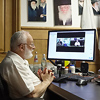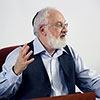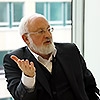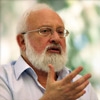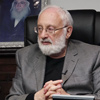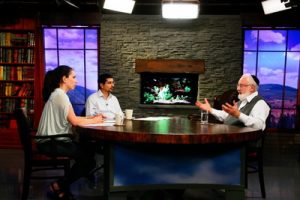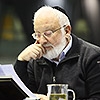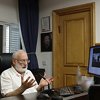 In order to bring contentment to the Creator, we must have a common desire since nobody’s individual desire is strong enough to be effective. The Creator is the result of our unity and He can only be reached from the center of our connection, the center of the ten. If we as much as aspire to achieve a common desire, we can already be connected with the Creator from that point.
In order to bring contentment to the Creator, we must have a common desire since nobody’s individual desire is strong enough to be effective. The Creator is the result of our unity and He can only be reached from the center of our connection, the center of the ten. If we as much as aspire to achieve a common desire, we can already be connected with the Creator from that point.
We keep developing and growing this desire in quality and quantity. The main thing is for each of us to check what kind of desire is inside of him and how determined he is at every moment to contribute it to the common desire, to the common Malchut, aimed at the Creator.1
The storehouse (vessel) of love is faith. Love is the Light of Hochma that transforms into the Light of faith, the Light of Hassadim. We need to develop such a vessel in ourselves in order to receive the Light of love for the Creator.2
It is written that to bestow to a friend is the same as to bestow to the Creator. Regarding my desire to enjoy, it makes no difference whether I bestow to the ten, the group, the world, or the Creator. After all, I separate myself from my desire in order not to receive in it. But in the bestowal itself, there is still a difference whether it is to give to the friends or to the Creator.
It is written that if a person reaches pure love and bestowal toward a friend, he also reaches love and bestowal toward the Creator along with it. With the help of the study and the work in the ten, I have to change my attitude toward the friends in order to see the genuine qualities of the Creator in them. Then, my love for the friends becomes so complete, that the love for the Creator is revealed within it.3
How can you go on with the same power and enthusiasm when you discover that all your actions are egoistic, for the sake of power, pride, selfishness, and the opposite of the correct intention? We understand that we act selfishly and that all our intentions and actions will necessarily be for our own sake. But at the same time, we want to move in the opposite direction. This is called “coming out of the exile in Egypt.”
We are under the power of our egoism, the intention for self alone, the egoistic attitude toward the group. We need to be aware of this and at the same time continue to act with the hope that our actions will become altruistic. Even if we do not yet have the correct intentions but only actions, by this, we attract the Light that reforms.
If our intentions were already altruistic, we would have been working with the inner Light. Now we work with the surrounding Light, and that is the difference—that so far, there is no intention for the sake of bestowal. Even if we are in the ego, in intentions for self alone, but we organize our actions as giving, we awaken the surrounding Light.
Therefore, we exist in the world of actions. After all, we can awaken the Light that reforms while still in the opposite form. This distinguishes the people with the point in the heart. They can feel the existence of bestowal, the Creator, the altruistic connection, but they are incapable of reaching it. They understand the power of bestowal, but they find themselves in the opposite state. Therefore, through their actions, they can cause the influence from the degree of bestowal called the Light that reforms.
Only people who have egoism and the point in the heart inside it, the two opposite qualities, are capable of it. Inside their egos they act forcefully, according to their nature, being in exile, slaves to the Pharaoh. But along with it, urged by the point in the heart, they aim to reach bestowal, escape slavery, and come out of exile. When they feel the glimmer of hope, once again they realize that they cannot break free from the ego, and so on over and over again. Until “the children of Israel sighed because of the work…and their cry went up.”
The two opposite qualities exist only in Israel, in a person aiming straight toward the Creator. He realizes that he is under the control of the will to receive, but at the same time, he is thinking of bestowal, of rising above himself. For him, it is not philosophy or psychology, but the actual purpose of life. He is given this desire within the desire, a spiritual point inside the egoism.4
From the 1st part of the Daily Kabbalah Lesson 1/27/19, “To Bestow Contentment to The Creator” (Preparation for the Convention in the Desert 2019)
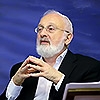 Question: If all events are already pre-planned, then what is the use of me changing? Whatever is meant to happen will happen anyway.
Question: If all events are already pre-planned, then what is the use of me changing? Whatever is meant to happen will happen anyway.
